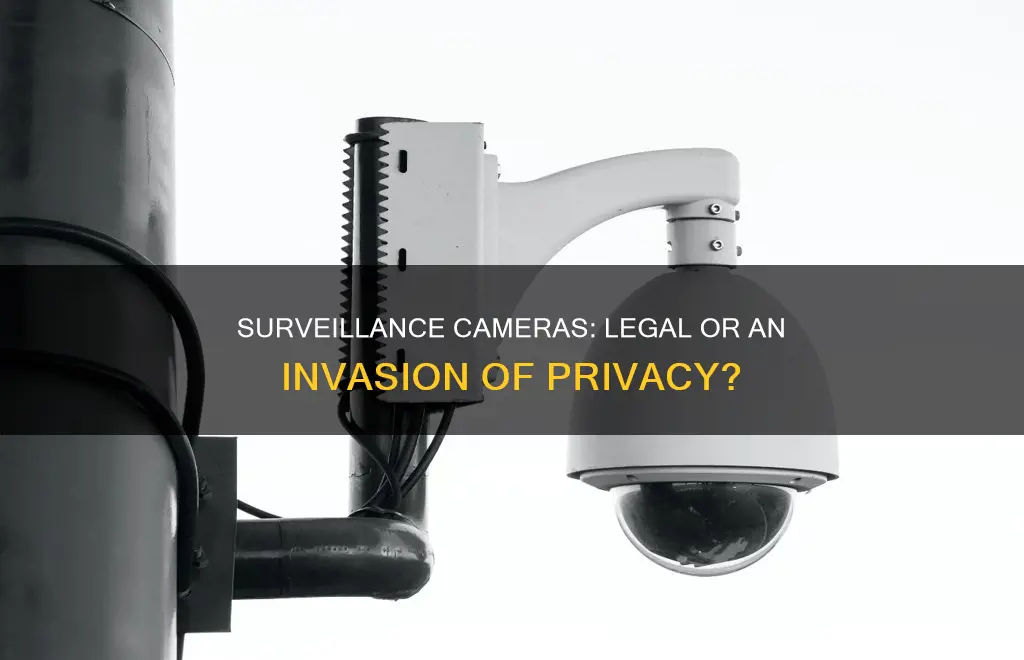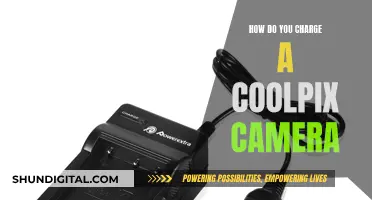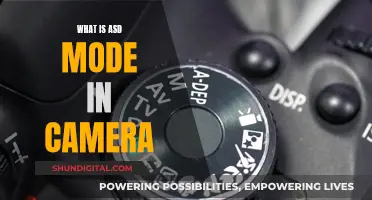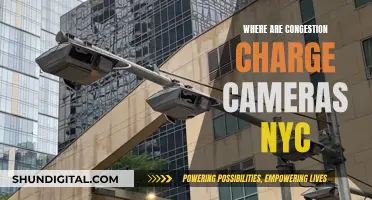
Security cameras are commonplace in today's world, with many people using them to protect their homes and businesses. However, the laws and policies surrounding their use can be complex and contradictory, varying from state to state and even county to county. While there is no specific federal law governing the use of security cameras, there are national laws around privacy and consent that must be considered, and certain instances where the use of surveillance cameras is illegal.
| Characteristics | Values |
|---|---|
| Legality of Surveillance Cameras | Generally legal, but with some exceptions and variations depending on location |
| Federal Laws | No specific federal law governing use of security cameras, but national consent and privacy laws apply |
| State Laws | Vary by state, with some having specific laws and others following federal guidelines; 15 states have specific security camera laws |
| Privacy | Individuals have a reasonable expectation of privacy in private places (e.g. bathrooms, bedrooms) |
| Consent | One-party consent laws allow recording with consent of at least one party; some states require all-party consent |
| Hidden Cameras | Generally allowed if following privacy and consent rules; 11 out of 15 states with specific laws allow hidden cameras |
| Notification | No legal requirement to post signs for video surveillance, but may be recommended to avoid consent issues |
| Audio Recording | More restricted than video recording; falls under one-party consent law, requiring consent from at least one party |
| Video Recording in Public | Allowed in all 50 states |
| Video Surveillance by Law Enforcement | Subject to regulations and disclosure requirements, e.g. POST Act in New York City |
What You'll Learn
- Surveillance cameras are generally legal outside, but not if they invade privacy
- Inside, cameras are only allowed in areas without a reasonable expectation of privacy
- Consent laws dictate that at least one person must consent to being recorded
- There are no federal laws prohibiting video surveillance, but there are some around audio
- Some states have stricter camera laws than the federal government

Surveillance cameras are generally legal outside, but not if they invade privacy
Surveillance cameras are prevalent in today's society, with many buildings, streets, and private residences having some form of video surveillance. While the presence of security cameras is commonplace, it is important to understand the legal implications of their use, especially concerning privacy.
In general, security cameras are legal, and their use can be a vital component of a well-rounded home security system. However, the legality of surveillance cameras depends on their placement and respect for privacy.
When placing security cameras outside, it is crucial to ensure they only capture footage of areas you own or control. This includes your front door, entryways, perimeter fence lines, property boundaries, driveways, decks, patios, garages, and yards. If you live in multi-family housing, common spaces may also be included. It is important to avoid pointing cameras towards neighbours' homes or public spaces beyond your property, as this likely breaches privacy laws. Be cautious of wide-angle lenses that may unintentionally capture areas outside your property.
While outdoor security cameras are often legal, there are restrictions on their placement to protect privacy. Certain areas are legally off-limits for security cameras as they violate reasonable privacy expectations. These typically include bathrooms, private bedrooms, and changing rooms. Placing cameras in these areas may result in criminal charges in some jurisdictions.
Additionally, it is important to consider the impact of security cameras on your neighbours' privacy. Avoid pointing cameras directly at neighbours' windows or backyard areas. If your camera can see into a neighbour's home, especially private spaces, it may be considered a privacy violation.
To summarise, surveillance cameras are generally legal outside as long as they are used responsibly and do not invade the privacy of individuals. Respecting privacy laws and maintaining trust within your community are essential when installing and operating outdoor surveillance cameras.
Analog Cameras: Still Relevant, Still Made?
You may want to see also

Inside, cameras are only allowed in areas without a reasonable expectation of privacy
The legality of surveillance cameras varies depending on the location and the jurisdiction. In the United States, there is no specific federal law that regulates the use of security cameras, but there are national consent and privacy laws that apply to video surveillance.
When it comes to the inside of a property, cameras are generally only allowed in areas where individuals do not have a reasonable expectation of privacy. This includes public spaces such as stores, where security cameras are commonly used to prevent shoplifting. However, even in these cases, the placement of cameras can become complicated when considering areas where individuals may expect a certain level of privacy, such as dressing rooms. While bathrooms are almost universally considered off-limits for cameras, the legality of cameras in dressing rooms has been the subject of debate, with cases splitting over the issue.
Other areas that are generally considered off-limits for security cameras include rented rooms, hotel rooms, and locker rooms. These spaces are typically expected to provide complete privacy, allowing individuals to feel comfortable undressing without worrying about being watched or having their footage broadcast.
It is important to note that specific regulations regarding security cameras may vary across different states and counties in the United States. For example, while some states require consent from all parties for audio recording, others only require the consent of one party. Therefore, it is essential to refer to the specific laws and regulations in your jurisdiction when considering the placement of security cameras.
Troubleshooting Camera Auto-Focusing Issues
You may want to see also

Consent laws dictate that at least one person must consent to being recorded
The use of surveillance cameras is a complex issue that varies depending on location and context. While there is no specific federal law governing the use of security cameras, there are national consent and privacy laws that must be considered. One such law is the "one-party consent" law, which states that it is legal to record a conversation, either in person or over the phone, if you have at least one person's consent. This means that if you are part of a conversation, you can legally record it without the consent of the other participants. This law applies to both audio and video recordings, as most security cameras capture both.
The "one-party consent" law is particularly relevant for homeowners who wish to install security cameras on their property. While it is generally legal to record video in public spaces, it is important to respect the privacy of others. For example, it would be a violation of privacy to point a camera into someone's bedroom or bathroom window. Similarly, it is important to consider the privacy expectations of guests and visitors when placing cameras inside your home. Areas such as bathrooms, bedrooms, and changing rooms are generally considered private and should be avoided when placing security cameras.
In addition to federal laws, many states, counties, and cities have their own regulations regarding security cameras. For example, California has strict laws prohibiting the recording of any communication considered confidential, regardless of consent. Other states, such as Florida, Alabama, and Minnesota, allow hidden video surveillance in non-private settings. It is important for individuals to familiarise themselves with the specific laws and regulations in their area before installing security cameras.
While the "one-party consent" law provides some guidance, the legality of surveillance cameras can be complex and nuanced. It is always advisable to consult with an attorney or legal expert to ensure that your use of security cameras complies with all relevant laws and respects the privacy rights of others.
GPU Rendering: Camera Mods and Their Impact
You may want to see also

There are no federal laws prohibiting video surveillance, but there are some around audio
The use of surveillance cameras is a contentious issue, and while there are no specific federal laws prohibiting video surveillance, there are laws around privacy and consent that must be considered. There are also regulations for recording audio, which differ from those for video.
Video Surveillance
In the US, it is generally legal to install a residential security camera and record video. However, citizens have a reasonable expectation of privacy, which extends to video recording. This means that recording people in private places, such as bathrooms, changing rooms, and private bedrooms, is illegal. The same applies to being filmed in these areas. An easy way to remember what falls under the "reasonable expectation of privacy" is to think about places where one would normally draw the blinds or close the door.
Audio Surveillance
The laws around audio recording are more complex and differ from state to state. The federal Wiretap Act prohibits anyone from secretly recording conversations that another person believes to be private. However, this act does not apply if at least one person in the conversation consents to being recorded, even if it is the person doing the recording. This is known as the "one-party consent" law.
Some states have stricter laws, requiring "two-party consent", where everyone involved must know the conversation is being recorded. As of 2022, 11 states require two-party consent when it comes to recording audio: California, Delaware, Florida, Illinois, Maryland, and six others.
Amcrest Cameras: Made in China?
You may want to see also

Some states have stricter camera laws than the federal government
In the United States, there is no specific federal law that regulates the use of security cameras. However, some states have stricter camera laws than the federal government. While it is generally legal to record video in public spaces, there are laws surrounding the expectation of privacy and consent that must be considered.
In most states, it is illegal to record video or audio in places where individuals typically have a reasonable expectation of privacy, such as bathrooms, bedrooms, and changing rooms. Some states, like New York, Rhode Island, and California, do not allow video cameras in any location where an individual has a reasonable expectation of complete privacy.
Additionally, some states have all-party consent laws, which require the consent of all parties involved in a conversation for audio recording to be legal. These states include California, Delaware, Florida, Illinois, and Maryland, among others.
Businesses must also comply with state laws regarding video surveillance. For example, in Delaware and Connecticut, businesses must notify employees and customers if there are video cameras on the property that may violate expectations of privacy.
It is important to note that laws surrounding security cameras can vary by state and county, so it is essential to check the specific regulations in your area.
Maintain Original Ratios in Camera Raw: A Simple Guide
You may want to see also
Frequently asked questions
The use of surveillance cameras is generally legal in the US, but there are some exceptions and limitations. There are no specific federal laws prohibiting video surveillance, but there are national consent and privacy laws that apply to video surveillance. There are also different regulations for recording audio and video footage.
Surveillance cameras are not allowed in places where individuals have a reasonable expectation of privacy, such as bathrooms, changing rooms, private bedrooms, etc.
In most states, you need the consent of at least one party for audio recordings. Some states, like California, Delaware, Florida, Illinois, and Maryland, require the consent of all parties.







